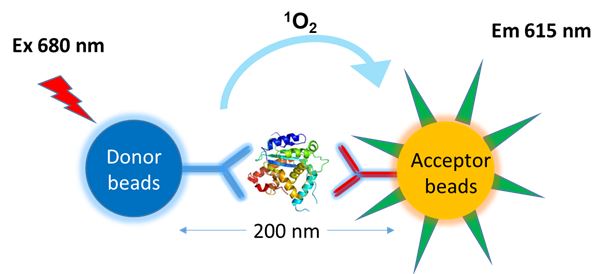No products
AlphaLisa™ and Alphascreen™ Assays (NB-SC105)
Alpha technology (Amplified Luminescent Proximity Homogeneous Assay) is a homogenous, no-wash assay method used to study biomolecular interactions in microplate format. The technology is based on Donor and Acceptor beads containing a proprietary mixture of chemicals, which, when excited emit luminescent signal. The Donor bead contains phthalocyanine which converts ambient oxygen (O2) to singlet oxygen when excited at 680 nm. As the singlet oxygen has a very short half-life (4 µsec) it is able to diffuse 200 nm in solution and transfer its energy to the thioxene derivatives within the acceptor beads resulting in luminescent signal production at 520-620 nm (AlphaScreen) or 615 nm (AlphaLISA). If there is no acceptor bead present within 200 nm in solution, singlet oxygen falls back to the ground state and no signal is produced.

Common Applications:
Biomarker/ cytokine detection: Immunoassays of secreted analytes from cell Culture or serum/ plasma
Cell signaling- To detect epigenetic/ kinase post-translational modifications
Cell-based assays- For studying pathways in whole cells, or studying endogenous receptors
To study protein—protein and protein—nucleic acid interactions
Second messengers: e.g., GPCR research
Ligand-Receptor Interactions Detection of Epigenetic or Post-Translational Modifications
Examples of Projects Completed at Novatein Biosciences
1. Development of an AlphaLisa assay for Screening Histone Methyltransferase Inhibitors
2. Antibody Pair Screening for TMEM153 /STING
AlphaLisa™ and Alphascreen™ are trademarks of Perkin Elmer, Inc.
